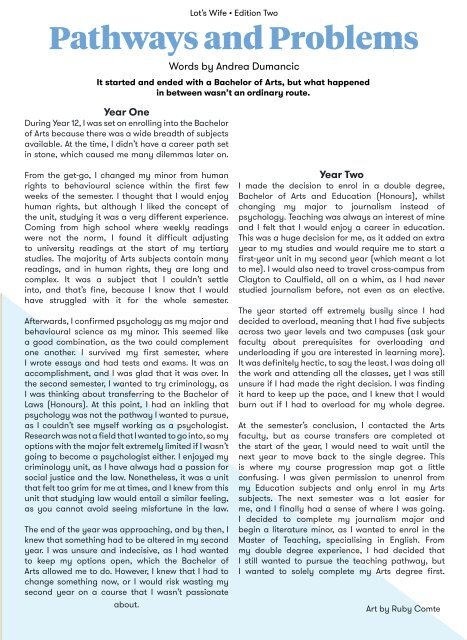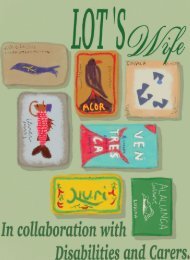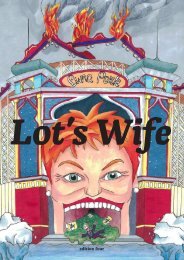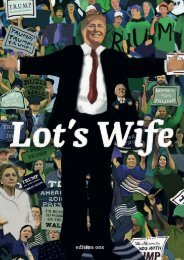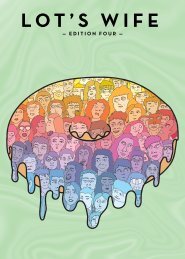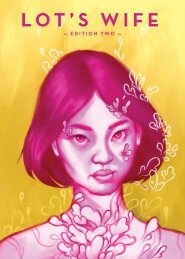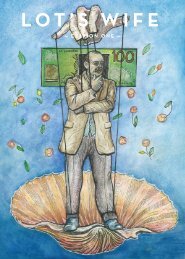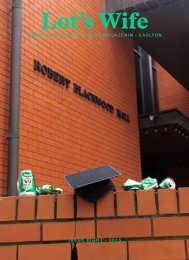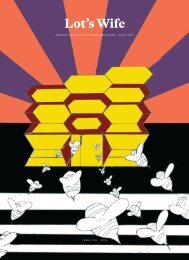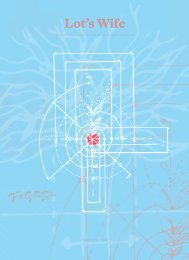Lot's Wife Edition 2 2021
Create successful ePaper yourself
Turn your PDF publications into a flip-book with our unique Google optimized e-Paper software.
Lot’s <strong>Wife</strong> • <strong>Edition</strong> Two<br />
Pathways and Problems<br />
Words by Andrea Dumancic<br />
It started and ended with a Bachelor of Arts, but what happened<br />
in between wasn’t an ordinary route.<br />
Year One<br />
During Year 12, I was set on enrolling into the Bachelor<br />
of Arts because there was a wide breadth of subjects<br />
available. At the time, I didn’t have a career path set<br />
in stone, which caused me many dilemmas later on.<br />
From the get-go, I changed my minor from human<br />
rights to behavioural science within the first few<br />
weeks of the semester. I thought that I would enjoy<br />
human rights, but although I liked the concept of<br />
the unit, studying it was a very different experience.<br />
Coming from high school where weekly readings<br />
were not the norm, I found it difficult adjusting<br />
to university readings at the start of my tertiary<br />
studies. The majority of Arts subjects contain many<br />
readings, and in human rights, they are long and<br />
complex. It was a subject that I couldn’t settle<br />
into, and that’s fine, because I know that I would<br />
have struggled with it for the whole semester.<br />
Afterwards, I confirmed psychology as my major and<br />
behavioural science as my minor. This seemed like<br />
a good combination, as the two could complement<br />
one another. I survived my first semester, where<br />
I wrote essays and had tests and exams. It was an<br />
accomplishment, and I was glad that it was over. In<br />
the second semester, I wanted to try criminology, as<br />
I was thinking about transferring to the Bachelor of<br />
Laws (Honours). At this point, I had an inkling that<br />
psychology was not the pathway I wanted to pursue,<br />
as I couldn’t see myself working as a psychologist.<br />
Research was not a field that I wanted to go into, so my<br />
options with the major felt extremely limited if I wasn’t<br />
going to become a psychologist either. I enjoyed my<br />
criminology unit, as I have always had a passion for<br />
social justice and the law. Nonetheless, it was a unit<br />
that felt too grim for me at times, and I knew from this<br />
unit that studying law would entail a similar feeling,<br />
as you cannot avoid seeing misfortune in the law.<br />
The end of the year was approaching, and by then, I<br />
knew that something had to be altered in my second<br />
year. I was unsure and indecisive, as I had wanted<br />
to keep my options open, which the Bachelor of<br />
Arts allowed me to do. However, I knew that I had to<br />
change something now, or I would risk wasting my<br />
second year on a course that I wasn’t passionate<br />
about.<br />
Year Two<br />
I made the decision to enrol in a double degree,<br />
Bachelor of Arts and Education (Honours), whilst<br />
changing my major to journalism instead of<br />
psychology. Teaching was always an interest of mine<br />
and I felt that I would enjoy a career in education.<br />
This was a huge decision for me, as it added an extra<br />
year to my studies and would require me to start a<br />
first-year unit in my second year (which meant a lot<br />
to me). I would also need to travel cross-campus from<br />
Clayton to Caulfield, all on a whim, as I had never<br />
studied journalism before, not even as an elective.<br />
The year started off extremely busily since I had<br />
decided to overload, meaning that I had five subjects<br />
across two year levels and two campuses (ask your<br />
faculty about prerequisites for overloading and<br />
underloading if you are interested in learning more).<br />
It was definitely hectic, to say the least. I was doing all<br />
the work and attending all the classes, yet I was still<br />
unsure if I had made the right decision. I was finding<br />
it hard to keep up the pace, and I knew that I would<br />
burn out if I had to overload for my whole degree.<br />
At the semester’s conclusion, I contacted the Arts<br />
faculty, but as course transfers are completed at<br />
the start of the year, I would need to wait until the<br />
next year to move back to the single degree. This<br />
is where my course progression map got a little<br />
confusing. I was given permission to unenrol from<br />
my Education subjects and only enrol in my Arts<br />
subjects. The next semester was a lot easier for<br />
me, and I finally had a sense of where I was going.<br />
I decided to complete my journalism major and<br />
begin a literature minor, as I wanted to enrol in the<br />
Master of Teaching, specialising in English. From<br />
my double degree experience, I had decided that<br />
I still wanted to pursue the teaching pathway, but<br />
I wanted to solely complete my Arts degree first.<br />
Art by Ruby Comte<br />
Year Three<br />
The rollercoaster wasn’t over yet when I entered<br />
my third year. I needed to graduate that year,<br />
and I had nine units left, meaning that I could<br />
underload for three semesters or overload for one.<br />
I chose the latter, and it definitely took its toll. It<br />
was overwhelming overloading for a second time<br />
and having to travel cross-campus (this was before<br />
COVID-19, when the only option for tutorials was oncampus,<br />
and attendance was marked every week).<br />
This was the year where I had to use recorders and<br />
cameras for journalism units, meaning I had to drag<br />
equipment from bus to bus just to return it all again.<br />
Although I managed to get through it, I would not<br />
recommend this load unless it is your only option.<br />
Completing my Arts degree felt like a success. I could<br />
finally breathe a sigh of relief and hang my degree<br />
on the wall to remind me of the many ups and downs<br />
I went through to achieve it. But just as my whole<br />
course was complicated, so too was the graduation<br />
process. Graduations in May were postponed due to<br />
COVID-19, so I waited a year to get my diploma in<br />
the hope of an on-campus graduation. That wasn’t<br />
possible last year, but I did still manage to celebrate<br />
by booking an on-campus photography session.<br />
I am now in my second year of the Master of<br />
Teaching and writing this piece at the conclusion<br />
of my second placement round. This goes to<br />
show that the indecisiveness and problems you<br />
face in your bachelor degree won’t last forever.<br />
Lot’s <strong>Wife</strong> • <strong>Edition</strong> Two<br />
10 11<br />
My Advice for You<br />
Trial and Error<br />
At Monash, we are fortunate enough to have the<br />
chance to pick our electives and change our minors<br />
and majors. Make use of this, and try a unit you<br />
have always wanted to learn about. Yes, you might<br />
not like it, and yes, that will mean that you’ll be a<br />
little behind in your new unit, but at least you will be<br />
able to witness whether you like a subject or not firsthand<br />
and not have any regrets about it later. Don’t<br />
be afraid to change degrees, but consider the effect<br />
it will have on your course progression and duration.<br />
Choosing the Right Course<br />
This is something that I have had to do myself<br />
because when picking a course or a career path, one<br />
can get ideas that are too big to be realistic. Analyse<br />
careers that you think you would enjoy, and then<br />
look more specifically at the courses related to those<br />
careers. Ask yourself if you would like the content and<br />
enjoy what is being taught. Do you like placements?<br />
If you want to study nutrition, are you aware that<br />
there will be chemistry classes? Do you know that<br />
some units require weekly oral presentations? Is this<br />
something that you feel comfortable with, and if not,<br />
is the course—and the job it leads to—right for you?<br />
Future Career<br />
If you are struggling to pick a course, think about what<br />
job you would like to do. We all have passions, and for<br />
some, it is difficult to pick one to build into a career.<br />
Hence, think about what you would be satisfied<br />
doing full-time because at the end of your course, it<br />
is you who will need to look for a job in that field.<br />
I hope that my story can help<br />
you see that you are not the<br />
only student who is feeling torn<br />
between courses and careers.<br />
Take your time to figure out exactly<br />
what you want from your course<br />
and your future; only then will you<br />
feel confident in your decision.


